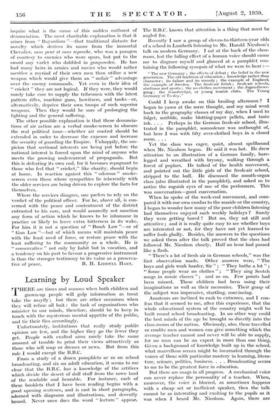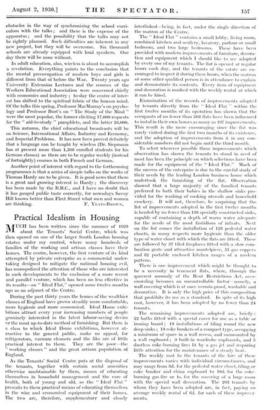Learning by Loud Speaker
q111ERE arc times and seasons when both children and
grown-up people will gulp information as trout take the mayfly ; but there are other occasions when they will refuse all bait : the task of organizations who minister to our minds, therefore, should be to keep in touch with the mysterious mental appetite of the public, and tic their flies accordingly.
Unfortunately, institutions that really study public opinion are few, and the higher they go the fewer they get. People with exalted aims rarely take the same amount of trouble to print their views attractively as those who sell soap or dresses or news. But from this rule I would except the B.B.C.
From a study of a dozen pamphlets or so on school broadcasting, and six on adult education, it seems to me clear that the B.B.C. has a knowledge of the artifices which divide the desert of dull stuff from the sown land of the readable and hearable. For instance, each of these booklets that I have been reading begins with a good opening sentence, and is cast in short paragraphs, adorned with diagrams and illustrations, and decently bound. Never once does the word " lecture " appear. The B.B.C. knows that attention is a thing that must be angled for.
Recently I saw a group of eleven-to-thirteen-year olds of a school in Lambeth listening to Mr. Harold Nicolson's talk on modern Germany. I sat at the back of the class- room, lest the lulling effect of a human Voice should cause me to disgrace myself and glanced at a pamphlet con- taining the following synopsis of what we were to hear :-
" The new Germany ; the effects of defeat ; the belief in the new generation. The old tradition of education ; knowledge rather than character ; its failure and its remedy ; the example of England; the example of Sweden. The fresh-air fetish ; fresh-air schools, stadiums and sports ; the no-clothes movement ; the Jugendbewe- gung ; the Wandervdgel, or young tourist clubs. The Young Germany of To-day.
Could I keep awake on this broiling afternoon ? I began to yawn at the mere thought, and my mind went back to the geography classes of my day, when I used to fidget, scribble, make blotting-paper pellets, and taste ink. . . . Perhaps in the German fresh-air school, illus- trated in the pamphlet, somnolence was unthought of, but here I was with fifty over-clothed boys in a closed Yet the class was eager, quiet, almost spellbound when Mr. Nicolson began. He said it was hot. He drew attention to an illustration of a German family, bare- legged and wreathed with bryony, walking through a forest of poplars. He talked of the health movement, and pointed out the little girls of the fresh-air school, stripped to the buff. He discussed the mouth-organ class (also illustrated in the pamphlet), and asked us to notice the roguish eyes of one of the performers. This was conversation—good conversation.
When he spoke of the week-end movement, and com- pared it with our own exodus to the seaside or the country, I began to wonder how many of the poor children listening had themselves enjoyed such weekly holidays ? Surely they were getting bored ? But no, they sat still and attentive ; and it is really quite easy to see whether boys are interested or not, for they have not yet learned to suffer fools gladly. Besides, the answers to the questions we asked them after the talk proved that the class had followed Mr. Nicolson closely. Half an hour had passed like a flash.
" There's a lot of fresh air in German schools," was the first observation made. Other answers were, " The boys and girls work harder, Sir " ; " They bathe a lot " ; " Some people wear no clothes " ; " They sing Scotch songs in music classes " ; and so on. Few points had been missed. These children had been using their imaginations as well as their memories. Their grasp of the subject was impressive, startling, convincing.
Amateurs are inclined to rush to extremes, and I con- fess that it seemed to me, after this experience, that the whole educational system of the country might well be built round school broadcasting. In no other way could the best minds of the age be brought so directly into the class-rooms of the nation. Obviously, also, these travelled or erudite men and women can give something which the average teacher cannot and never will be able to supply, for no man can be an expert in more than one thing, Given a background of knowledge built up in the school. what marvellous scenes might be incarnated through the voices of those with particular mastery in learning, litera- ture, science, politics, business. . . . Broadcasting seems to me to be the greatest force in education.
But there are snags in all progress. A mechanical voice can never replace the personality of a teacher. When, moreover, the voice is blurred, as sometimes happens with a cheap set or inefficient speaker, then the talk cannot be as interesting and exciting to the pupils as it was when I heard Mr. Nicolson. Again, there are obstacles in the way of synchronizing the school curri- culum with the talks ; and there is the expense of the apparatus ; and the possibility that the talks may not be rightly planned. Such difficulties are inherent in any new project, but they will be overcome. Six thousand schools are already equipped with loud speakers. One day there will be none without.
In adult education, also, wireless is about to accomplish a revolution. Everything points to the conclusion that the mental preoccupation of modern boys and girls is different from that of before the War. Twenty years ago University Extension Lectures and the courses of the Workers Educational Association were concerned chiefly with economics and industry ; to-day the centre of inter- est has shifted to the spiritual fabric of the human mind. Of the talks this spring, Professor MacMurray's on psycho- logy and Professor Burt's on " The Study of the Mind " were the most popular, the former eliciting 17,000 requests for the " aid-to-study " pamphlets, and the latter 26,000.
This autumn, the chief educational broadcasts will be on Science, International Affairs, Industry and Economy, and Imperial Problems. It has now been proved definitely that a language can be taught by wireless (Dr. Siepmann has at present more than 1,500 enrolled students for his German classes) so there are to be regular weekly (instead of fortnightly) courses in both French and German.
Another point of interest with regard to the forthcoming programmes is that a series of simple talks on the works of Thomas Hardy are to be given. It is good news that there is a great and growing interest in Hardy ; the discovery has been made by the B.B.C., and I have no doubt that it has gauged public taste correctly, for nowadays Savoy Hill knows better than Fleet Street what men and women

































 Previous page
Previous page